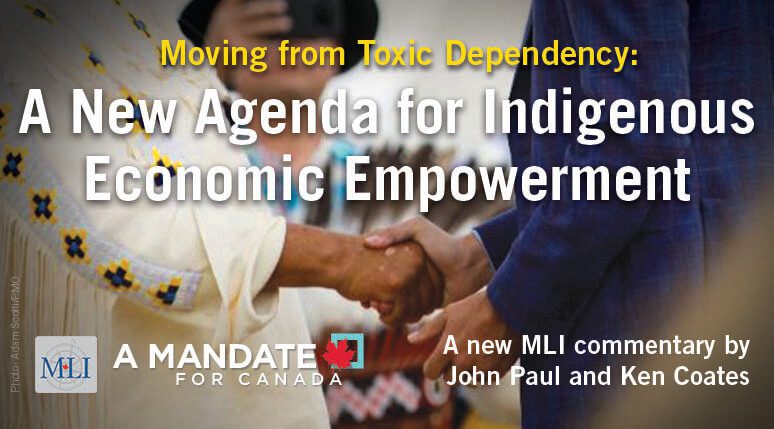 OTTAWA, ON (July 18, 2019): With a federal election approaching, politicians and policy-makers must re-evaluate Indigenous policy. Financial transfers and program spending are not helping First Nation communities get ahead. The status quo of Indigenous living standards and quality of life is not acceptable to Indigenous peoples or to Canadians as a whole. Clearly, a new fiscal and governing approach is needed.
OTTAWA, ON (July 18, 2019): With a federal election approaching, politicians and policy-makers must re-evaluate Indigenous policy. Financial transfers and program spending are not helping First Nation communities get ahead. The status quo of Indigenous living standards and quality of life is not acceptable to Indigenous peoples or to Canadians as a whole. Clearly, a new fiscal and governing approach is needed.
In the latest edition in MLI’s “A Mandate for Canada” series, Munk Senior Fellow Ken Coates and John Paul, Executive Director of the Atlantic Policy Congress (APC), make a persuasive case for re-setting the First Nation-government relationship.
The paper, titled Moving from Toxic Dependency: A New Agenda for Indigenous Economic Empowerment, explores how the postwar expansion of the welfare state led to an exponential increase in program spending on Indigenous peoples, but resulted in little obvious improvement in living standards. In fact, even with increased funding, First Nations communities have seen an increase in many social problems and pathologies.
“The soul-destroying, dependency-creating reliance on the federal government has not been a foundation for Indigenous revitalization and socio-economic development,” write the authors. “The evidence from the past 50 years suggests that government spending does not produce the desired results.”
Paul and Coates do not suggest that increased government spending caused the societal difficulties. Rather, they point out that increased government spending has failed to adequately address the fundamental challenges facing Indigenous peoples and communities.
The result was to create toxic levels of dependency. This occurred at the personal level, with individual Indigenous peoples and families relying on government transfer payments across generations. Indigenous governments also became locked into a perpetual cycle of applications, reviews, and reporting with Ottawa. Indigenous governments also lacked the own-source revenues needed to establish and maintain real autonomy from the federal government.
“Make no mistake: money is required. It will take more money, even much more money, to address generations-long problems and challenges. It is not the funding per se that is the problem, but rather the way the money is delivered to Indigenous communities and governments,” write Paul and Coates.
The authors make the case for a healthy autonomy for First Nation governments, drawing upon the well-documented insight that increased sovereignty is the way forward for addressing First Nation problems. Key elements of a new approach could include:
- Expanding the co-production of government policy at all levels, including close consultations with affected Indigenous communities and organizations.
- Establishing shared financial priority setting between governments and Indigenous communities.
- Prioritizing a rough equivalence in government-funded infrastructure and public services during budget development. This includes rough equivalence between Indigenous and non-Indigenous peoples.
- Accelerating the negotiation of appropriately funded and need-based self-government agreements, as and when Indigenous communities are ready for such a transition, subsequent to renegotiation and amendment over time.
- Providing greater government support for Indigenous governance structures.
- Revising and reforming funding arrangements between Indigenous governments and Ottawa toward long-term block funding and away from program and project-based allocations.
- Reviewing and revising the financial arrangements between the federal government and Indigenous partners with a view to transferring authority to Indigenous groups when they are willing to do so.
- Working with regional Indigenous groups, organized geographically, culturally, or through existing organizations, like tribal councils where appropriate and where desired by the Indigenous communities.
The issues facing Indigenous communities in Canada vary and are complex. While these recommendations will not fix all of the issues present, Coates and Paul argue that this new agenda is necessary to set economic empowerment back on track.
To read the commentary in full, click here.
***
Ken Coates is MLI’s Munk Senior Fellow in Aboriginal and Northern Canadian Issues. He is the Canada Research Chair in Regional Innovation in the Johnson Shoyama Graduate School of Public Policy at the University of Saskatchewan. John Paul is the Executive Director of the Atlantic Policy Congress of First Nations Chiefs Secretariat in Dartmouth, Nova Scotia.
For more information media are invited to contact:
Brett Byers-Lane
Communications and Digital Media Manager
613-482-8327 x105
brett.byers-lane@macdonaldlaurier.ca




